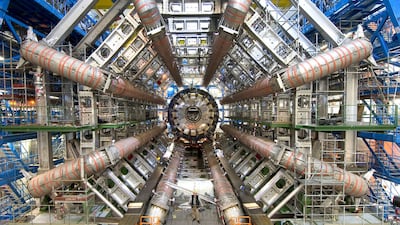Scientists are seeking to build a supercollider three times larger than the Large Hadron Collider (LHC) in a bid to access more of the universe's secrets.
So far the LHC has enabled researchers to detect a new particle called the Higgs Boson but since the discovery in 2012 further attempts to uncover dark matter and dark energy have failed.
The new atom-smasher, called the Future Circular Collider (FCC), will cost £12bn to build and would be built in two phases, one in 2040 and the other in 2070.
It would be funded by member nations of the European Organisation for Nuclear Research (Cern), including the UK.
Cern's Director General, Fabiola Gianotti, said a more powerful instrument was needed to allow humanity to "make enormous steps forwards in answering questions in fundamental physics about our knowledge of the universe".
At 91km the circumference of the FCC will be nearly three times that of the LHC, and it will be twice as deep.
The present LHC, which cost £3.75 billion to build at Cern in Switzerland, has not yet been able to find particles that will help to explain 95 per cent of the cosmos.
The 27km-long LHC is the machine that found the Higgs Boson particle, which along with its linked energy field is thought to have played a vital role in the formation of the universe after the Big Bang, 13.7 billion years ago.
The Higgs finding proved that particles acquire mass by churning through an invisible field, like winter shoes gathering snow, and was a moment of excitement for physicists working on the theory.
The LHC flings particles at each other at nearly the speed of light and was the first collider powerful enough to generate enough evidence for the Higgs Boson particle, which is produced in about one in every billion of these collisions.


